Close your eyes. Think back to early 2004. Same-sex marriage was not legal, and George W. Bush wanted the U.S. Constitution to ban it outright. Gay couples in many states couldn’t adopt children. “They” was still just a plural pronoun to the general public. It was, in some ways, a dismal time for our community.
But there were also signs of the changes that would come. San Francisco bucked state law and issued marriage licenses to same-sex couples, while Massachusetts was about to become the first state in the U.S. to officially allow same sex marriage. Lawmakers were finally recognizing that discrimination based on sexual orientation was wrong, and that LGBTQ+ people deserved protections – from firing, from hate crimes, from bullying. The word “queer” continued its long journey toward reclamation in some circles, casting off its dark history as an epithet to become a prideful label for many LGBTQ+s – and the people who fall somewhere between all those initials.
At the same time, a major network was about to launch a sexy, funny, poignant, and powerful drama, starring mostly little-known actors, centered entirely on a glamorous, gorgeous, and proud community of lesbians in Los Angeles. “The L Word” couldn’t have seemed more improbable when it premiered in January of 2004, but as our world evolved – partly thanks to this show’s existence and the exposure it gave to our community’s wants, needs, desires, and dreams – its place in history quickly became inevitable. With “The L Word,” lesbians had finally arrived.
And now, they’re back. December 8 is basically lesbian Christmas, when we get the best present of all: the debut of “The L Word: Generation Q” on Showtime. This new series picks up 10 years after the original left off, with a new cast of characters and a few OGs: Jennifer Beals, Leisha Hailey, and Kate Moennig (aka Bette, Alice, and Shane), who are all executive producers along with the original creator Ilene Chaiken. And there’s a new showrunner, 34-year-old Marja-Lewis Ryan, who is bringing her sensibility as a younger lesbian – and superfan of the original series – to update the show for a new era in lesbian and queer visibility.
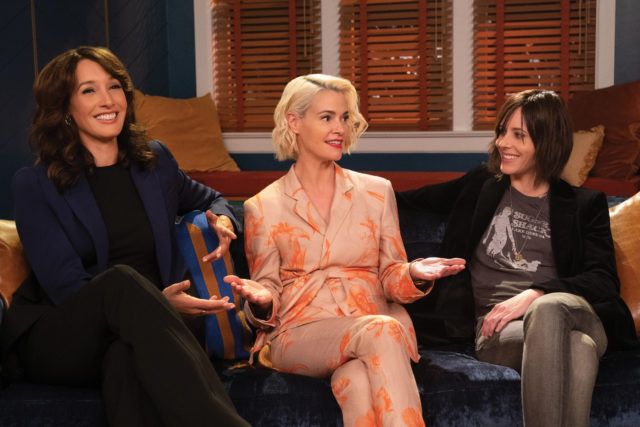
Looking back, looking ahead
It’s no secret that the original “The L Word” faced some criticism in the inclusivity and diversity departments. It’s also no secret that our realities have changed, both on-screen and off, since then. “The L Word” depicts a moment in time for lesbians and queer women – 2004 to 2009 – that today could appear quaint, or at best, a fantasy. It showed a world where sports stars did not come out, transgender people lived in shame, and even the most butch character was slathered in makeup.
The team behind the reboot sees “Generation Q” as a fresh opportunity to tell our stories from a more inclusive lens. In a way, it has the original series to thank for setting in motion our community’s own evolution toward inclusivity, because it was the first to put our stories at the forefront.
“I think the television landscape has changed tremendously, not just the queer representation on television, but television generally,” Ryan tells GO. “Shonda Rhimes has done wonders for our people; Jill Soloway and Ryan Murphy have made huge strides. I’m really excited to not have to shoulder all queer stories, like the original [“The L Word’] had to. I just tried to cast a pretty wide net; our writing staff and our cast look almost identical. That’s like sort of the dream, right? I don’t have to guess. I just have to hire well, shut up, and listen.”
Indeed, Ryan did hire well. For one thing, a transgender actor is playing a transgender character, a welcome improvement from the original series that put Daniela Sea into the role of Max Sweeney.
“‘Generation Q’ takes a deep look into queer life now, into the ways that gender and sexuality are fluid for so many people,” says Leo Sheng, the actor who plays trans character Micah Lee. “We’re using language that wasn’t as widely used or accessible 10-15 years ago, talking about identities that are still fighting to be included in spaces but that have gained a certain amount of visibility since the original. ‘Generation Q’ is about honoring where we’ve been, about where we’re going, and about celebrating queerness in all of its forms.”
After all, despite any criticisms of some of the situations in the original series, celebrating our community was always what the show was about – and there’s no denying the impact that had. “The L Word” put lesbians on screen in front of a wide audience and showed the world we deserve to be seen. The show became a cultural flashpoint with staggering global significance for our community.
The glitzy premiere parties. The gaga fans. The Sunday night screenings at the apartments of the friends who had Showtime. The secretive rentals of the DVDs. The pulsating tension between teen girls as they watched together after school. There’s hardly a lesbian over 18 who wasn’t obsessed with “The L Word” at one time or another. Boomers raved about it. Gen Xers saw themselves. Millennials came of age through it all. And Gen Zs are streaming it and discovering it anew.
“It served as a generational cultural thread,” says Amy Lesser, GO’s publisher, who organized several popular “The L Word” events with cast-members during the show’s initial run. “Prior to the show’s debut, we never had a flag-bearer, culturally, for this community. ‘The L Word’ united lovers and haters around the virtual water-cooler to discuss something other than politics or our cultural and generation differences. The show changed perceptions, conversations, lives.”
It certainly changed mine.
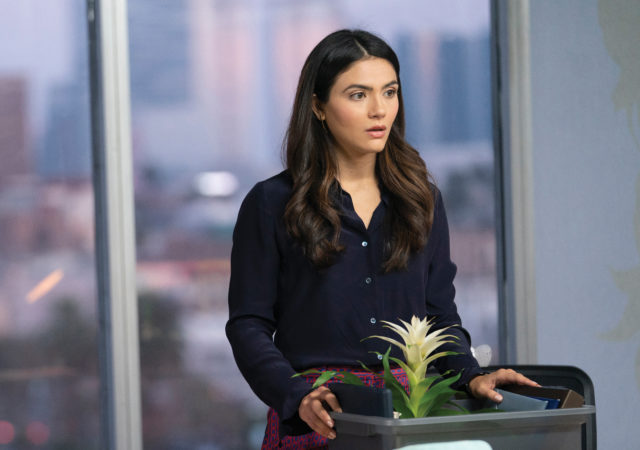
A cultural moment
Charlie was my first love. We were score-keepers together for the girls’ basketball team — Charlie because she loved sports, me because I just wanted to be close to Charlie. We’d take a school bus filled with sporty girls (purr) to whichever high school was hosting the game. Charlie would watch my breasts bounce as the bus went over Long Island highway potholes, and I’d write cheesy poems about her for my creative writing elective. Then, we’d take the bus home and go secretly watch “The L Word” in her basement, practically vibrating with excitement and revelation.
“The L Word” was a sacred ritual where we could glimpse our futures, see ourselves, and pine endlessly for all the gorgeous women. I was in love with Shane, all the way down to her Keith Richards-inspired outfits, her messy hair, and her irresistible swagger. I could practically smell cigarettes and sex wafting off of Shane through the TV screen, sitting on the couch next to Charlie, our hands daring to touch. The volume playing low so as not to catch the attention of her mom. Her West Highland Terrier curled up on the carpet. My heartbeat quickening and the lump rising in my throat.
A lot has changed in the 10 years since I was a pudgy, nervous teen. And now, Shane, Bette, and Alice are “all grown up” and joined by brand-spanking-new dykes and their drama. But what remains the same is the massive cultural moment that “The L Word” was and will be.
Like so many queer women, Ryan remembers watching “The L Word” in her college dorm and having an equally transformative experience. “It was groundbreaking. I got to see myself on television for the first time, and that inspired me to be able to write … about my own people,” she says.
“My dream as the showrunner of this new show is to get a few more people to have the experience that I had. More people to see themselves on screen and also behind the lens, too, and be as inspired as I was by the original show. I cannot represent all people; I’m just trying to represent a few more people well.”
Ryan can’t contain her excitement to be overseeing the very show that set her on her career path. (She credits much of her writing inspiration for her first screenplay, “The Four Faced Liar,” to “The L Word.”) She speaks with electricity about her passion for “Generation Q,” and maybe even a little shock that she gets to be the showrunner.
“I have moments where I, like, pop out of my life a little bit. On set, the first time the three of them [Beals, Hailey, and Moennig] were in a scene together — that first scene at the restaurant — that was the first time the three of them had shared a frame, since, you know, 2009. It was just so f*cking trippy. I mean just so trippy. I was like, ‘They’re there, but they sound like me!’ And it’s crazy.”
Going from fan to showrunner has been completely unreal. “BANANAS! Can you believe it?!” Ryan bursts out. “Isn’t it so weird? I was 19 when the show came out. I watched it on DVD from Blockbuster in my dorm at NYU. And then, about 12 years later, I was in a writers’ room with Ilene Chaiken.” Ryan and Chaiken were both hired to write on a feature. “I obviously knew who she was, and she obviously did not know who I was. I was super fangirled out and we had the best time together. We just really hit it off in that week.”
After the debut of “The Handmaid’s Tale,” which Chaiken adapted for Hulu, Ryan wrote Chaiken an email. “I was like, ‘Hey, I don’t know if you remember me, but I love ‘The Handmaid’s Tale.’ Congratulations.’ And she wrote me back. She said, ‘I was just thinking of you. Do you want to come and pitch on ‘The L Word?’” The rest is herstory.
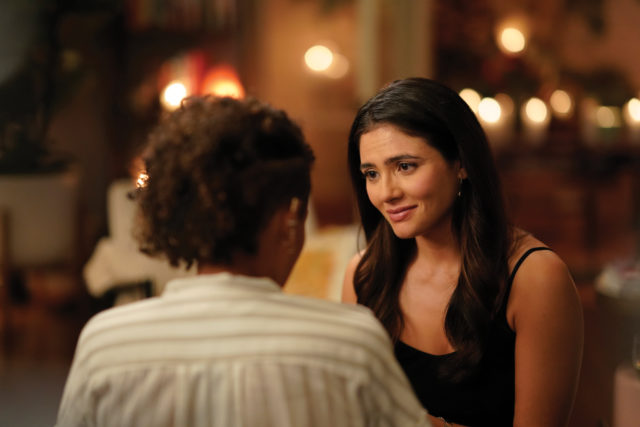
Political rebound leads to reboot
The idea for “Generation Q” first took root one particular night in 2016: election night. As Chaiken and Beals told the New York Times, they spoke to one another on the phone when it became clear Donald Trump was going to be the next president. Maybe the job of “The L Word” wasn’t done.
What was clear in 2016 was that a backlash was beginning to fester after all the strides the LGBTQ+ community had made in recent years. Now in 2019, with the country more divided than ever, with hate and ignorance still alive, the time is ripe for the groundbreaking, mainstream show about queer women to return.
While we can and should expect changes in the LGBTQ+ landscape to be reflected in “Generation Q,” we can also be relieved that the aspects we know and love about the original live on. Most importantly, three beloved characters return: Shane has a private jet, Bette is running for mayor, and Alice is the host of a TV talk show.
How do these classic characters wind up in the same circle as a new, younger crew of friends? As Alice showed us with The Chart, it’s not that unusual, as there are usually six glittering degrees of homosexual separation in this community. You might even know me, and I might know your ex-girlfriend’s cousin’s aunt’s bowling partner’s cat’s babysitter. In other words, they found each other seamlessly.
“I really did think about, like, if Bette’s running for mayor, who does she need? If Shane is alone, who complicates that? And same thing for Alice. Alice is going through sort of this whole journey of figuring out who she is under these circumstances. So we put someone in front of her who has had to deal with those issues. It’s kind of this interesting dynamic that came out organically,” Ryan explains, assuring us that we can expect these old and new loves to collide.
Ryan has a theater background, meaning for her, character development is more prominent than plot. In order to develop characters that are already known and loved alongside brand-new characters, she had to know them all intimately. Ryan strategized, “The way I approached this job is, what did I love? What did I love in the original and, just, like, don’t change it, don’t change the thing you love. And so, Shane’s still Shane. She’s just Shane under these circumstances. And Bette’s still Bette, she’s just Bette running for mayor. And Alice is still Alice, she just has her own talk show. They’re all the same people because those were the people that we all loved. And their circumstances have changed, like the circumstances of all of our lives have changed since then, too. Bette’s kid is now 16.”
Way to make us feel old! Bette’s kid, Angelica, might even have her own queer storyline. “It was very fun to write for her, and very fun to write for Jordi [a new character, played by trans actress Sophie Giannamore]. They have a great relationship, a great chemistry, and it was really fun to have this 16-year-old queer story inside of this adult narrative.”
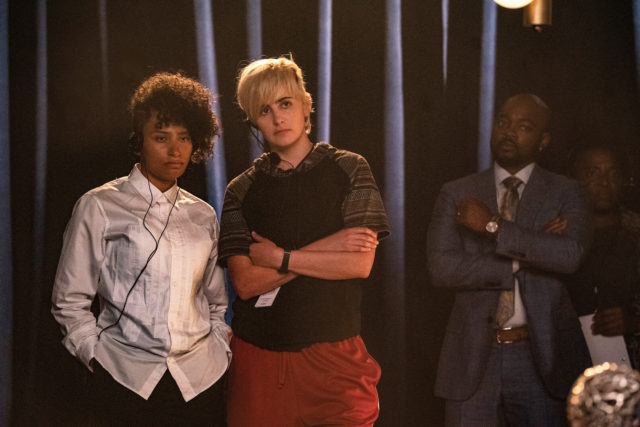
Reversing shame, breeding empathy
As for the new characters, if the first scene of the first episode is any indication, they will soon be as iconic as the OGs. It starts with a hot, powerful – and bloody – sex scene between Sophie (played by Rosanny Zayas) and Dani (Arienne Mandi). “That opening scene for me is all about reversing shame. It’s about brown bodies experiencing pleasure, and that periods are okay, and love is okay, and a lot of things are just okay. It’s like third wave feminism — just in a really hot sex scene — for 45 seconds. I know I’m gonna catch shit for it,” Ryan tells GO.
Shame — and how to counteract it — is a big theme for Ryan. “Our people really harbor lots of shame; that is why we have a Pride parade. All of my characters are on various journeys to correct their own shame. The most obvious one, and the one I think people will hold onto most, is Finley’s story.” New character Sarah Finley, played by Jacqueline Toboni, is an Irish-Italian kid from the Midwest who grew up in a Catholic household and grapples with the intersection of faith and sexuality. “Finley is a really close narrative to my own life, but also a lot of the writers in my room. I haven’t really seen that inside a character like hers that doesn’t feel like an after school special, it feels very lived in,” Ryan tells me.
Finley’s role was written specifically for Jacqueline Toboni, who had worked with Ryan in the past on a play — “Bugaboo and The Silent One.” “I have a very special relationship with her; I was just rooting for her so hard. When she came in and auditioned, I was like, ‘I really hope she doesn’t blow this.’ She was in my original pitch. She holds a very special place for me. I can’t wait for the world to meet her,” Ryan explains.
Neither can I. But is Toboni ready for droves of lesbians to crush on her? “I don’t think any of them are!” Ryan jokes. “I don’t think that has clicked, let alone the fandom that will certainly follow.”
Finley’s journey isn’t that different from Toboni’s. “I grew up Catholic, so a lot of the research I would have had to do was already done [on Finley],” Toboni tells GO. “I feel like I put in a lot of work into that already. I think Finley deals with shame in a specific way.” Toboni hopes that “Generation Q” will show so many young people that “it’s really scary, but you’ve got to give yourself the opportunity to live fully in your own skin.”
Toboni was shook to work on “Generation Q,” as she vividly remembers watching the original. “I loved it. I was obsessed, especially in high school. So being able to come onto this show feels like a dream come true,” she says. “With Leisha, I outed myself as a fan so many times. It’s so embarrassing. I’m definitely still a fan even though I’m on the show.”
Toboni is no stranger to playing queer characters, and you might know her as Jo on “Easy.” “It’s always quite gratifying when you can marry your passion with doing good in the world,” she says. “I think queer visibility is really important. I hope parents watch this show. And I hope they understand that tolerance isn’t acceptance. I don’t know how many fundamental religious people are reading your magazine, but—,” she stops. (Luckily for Toboni, my Italian Catholic mother religiously reads every article I write. And she totally has a crush on Kate Moennig, for what it’s worth.)
Maybe it’s because of a strikingly similar haircut, but I couldn’t help but wonder if Finley could be the next (awkward, goofy) Shane. Toboni set me straight. “Shane is the most iconic, crushable … lesbian character that’s ever been on TV. They are super different. I think Shane deals with her messed up past by keeping everything in and keeping people away. She’s mysterious and sexy and cool. Finley is just so the opposite. Finley tries to make people laugh.” And Finley is relatable.
“When I watched the original ‘[The] L Word,’ Shane seemed like a rock star. It was so aspirational; there was no chance I was going to be able to dress as cool or whatever. Finley and a lot of characters on ‘Generation Q’ are a bit of a mess. Like, I’m not wearing the coolest clothes. I’m not looking super-hot all the time. I think it’s a lot more relatable. And I think relatability is important for queer people to see on TV, because relatability breeds empathy.”
Indeed, Finley is quirky and adorable, and a lot of queer women will undoubtedly see themselves in her. She is making mistakes, stealing bikes, flipping off dudes, kissing girls, and being unabashedly herself. “I hope some girl, or some queer person, in the middle of the country, who is struggling with her religion and queer identity, just knows that there are so many people waiting to love them,” Toboni says.
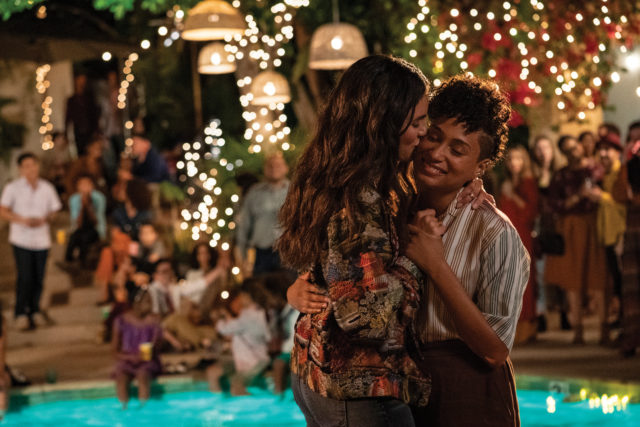
A unified cast
There are so many people waiting to love Finley, and Micah, and Dani, and Sophie too, thanks to the stellar cast.
Back to that opening scene. (I told you it was unforgettable.) Sophie and Dani’s chemistry is utterly palpable, and the pair’s connection only intensifies throughout the pilot and culminates in a tear-jerkingly adorable lesbian proposal they’d been preparing for since their auditions.
“My audition was intense. I spent two days meditating before my final audition so my nerves wouldn’t get in the way. I then had a chemistry read with the amazing Ari,” says Zayas. “In this [chemistry] read, we did the proposal scene and you could tell there was just so much love between us. That’s really the story I want to tell,” Mandi adds.
Like Toboni, Mandi and Zayas grew up watching “The L Word.” “It came on late at night, and of course, I stayed up knowing the next day I would be so tired for school. I didn’t realize the impact it was having on me. It was later on that I realized the immense sense of freedom that show gave me,” says Zayas.
Was it intimidating to work alongside the power dykes of the original cast (even if one is straight IRL)? In fact, the actresses were very kind to the new cast. Mandi, whose character Dani Nunez is an ambitious PR exec, says the OGs were a pleasure to work with. “Jennifer, Leisha, and Kate were so welcoming. They made us feel [like] part of the family right from the start. Ilene was so excited for us all, and made us feel so special. And Marja just went above and beyond. She created such complex and real characters and truly made it so easy for us to feel connected to our roles. She guided us through this whole process with such care.”
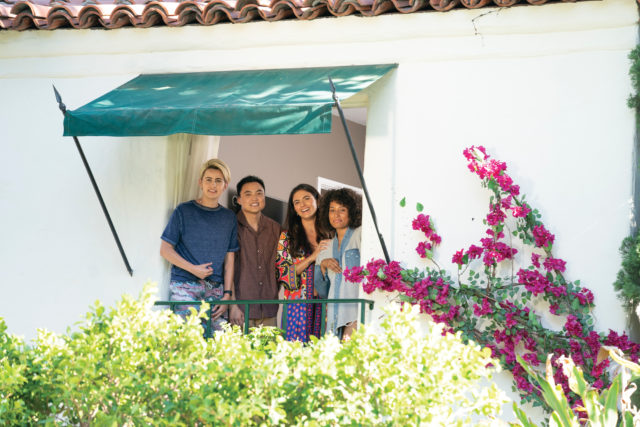
The heroes in our stories
Ten years after the original “The L Word” went off the air, I am watching the screener of “Generation Q” on my blue velvet couch, alone in my Bushwick apartment in a low cut black Finders Keepers dress and bright red lip (I felt it necessary to get dressed up for the occasion). I’m an out and proud lesbian and the managing editor of one the nation’s preeminent and most widely read lesbian publications. A lot has changed since those afternoons with Charlie in the basement.
As the pilot begins and Lizzo’s iconic “Better in Color” blares through my speakers and the new gorgeous cast members flash across the screen, I can’t help but squeal with excitement. The theme song might no longer be talking, laughing, loving, breathing, fighting, f*ckng, crying, drinking, kissing, thinking, dreaming, but let it be a testament to the inclusive changes “Generation Q” is committed to.
Seeing three lesbian icons in one frame after so long — reflecting on what they meant to me at such a transformative time in my life, how much they’ve grown, and how much I’ve grown with them — is enough to make me burst into tears.
“The L Word” has undeniably changed us. It helped us discover ourselves, gave us representation, hot sex scenes, juicy drama, and is arguably one of the most influential cultural artifacts of the modern lesbian experience. As for its criticisms, some say if you want reality, take the bus, while others say art should imitate life. How does Ryan deal with this?
“I mean, that’s the hardest part of my job: making sure I’m not sweeping things under the rug. But also, the show is meant to be aspirational, it’s meant to be hopeful, it’s meant to be joyful, it’s meant to be escapism, so how do I combine those two things? The way I approach it is: We are the heroes in our own stories. As opposed to other stories where we’ve been the sidekicks or victims, this time we’re the heroes.”
“The L Word: Generation Q” premieres December 8th at 10pm on Showtime.

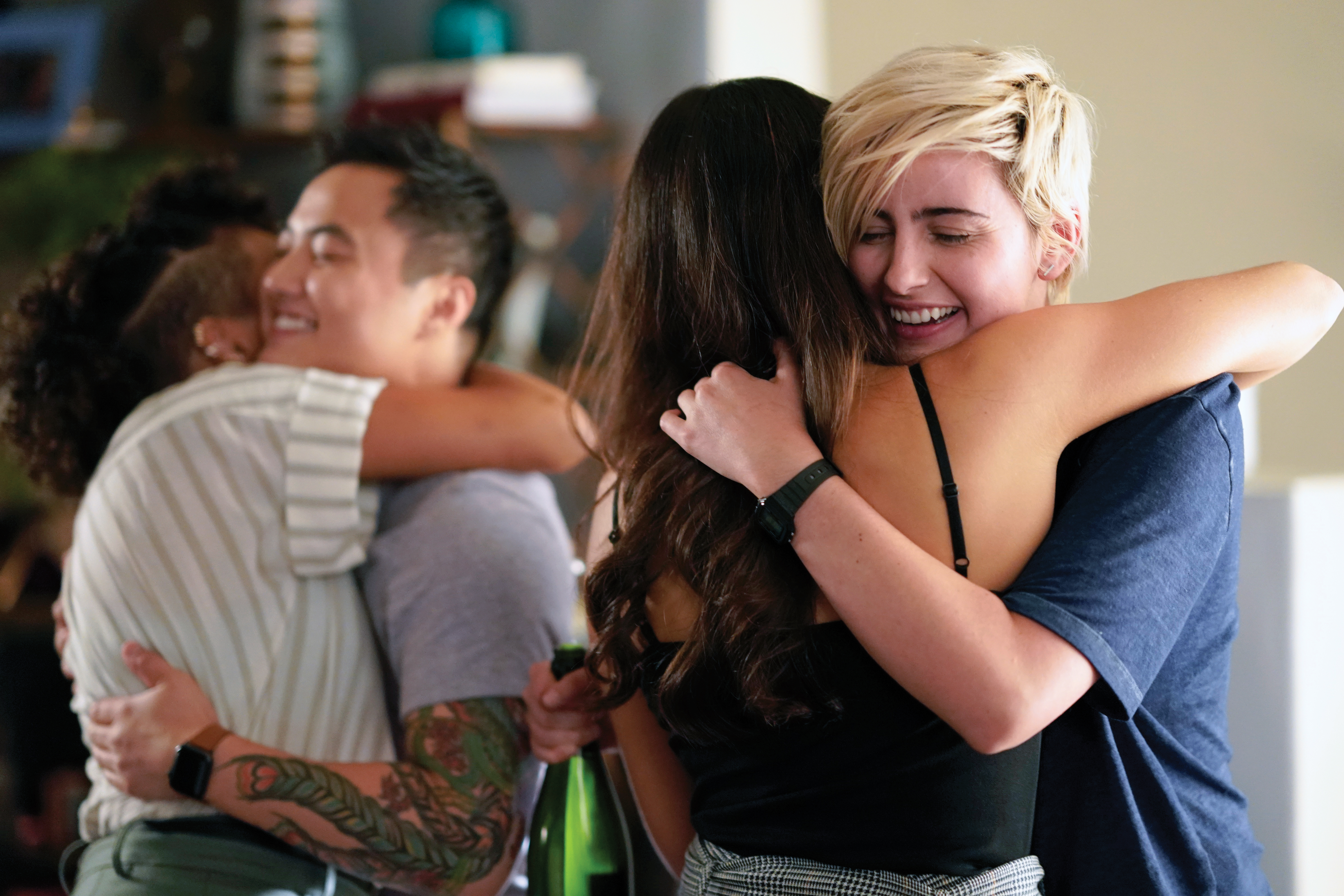
What Do You Think?